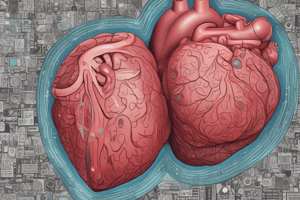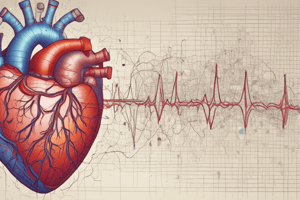Podcast
Questions and Answers
β blockers are no longer considered first-line therapy for hypertension.
β blockers are no longer considered first-line therapy for hypertension.
True (A)
Which of the following is NOT an adverse reaction to β blockers?
Which of the following is NOT an adverse reaction to β blockers?
- Bradycardia
- Fatigue
- Weight gain (correct)
- Cold peripheries
What should be done before giving a β blocker to a patient in uncompensated heart failure?
What should be done before giving a β blocker to a patient in uncompensated heart failure?
Stabilize it using diuretics first
Sudden withdrawal of beta-adrenoceptor antagonists may result in severe exacerbation of __________.
Sudden withdrawal of beta-adrenoceptor antagonists may result in severe exacerbation of __________.
What is an example of a compensatory mechanism that limits the response to antihypertensive agents?
What is an example of a compensatory mechanism that limits the response to antihypertensive agents?
How long after withdrawal of β blockers do hypersensitivity symptoms typically appear?
How long after withdrawal of β blockers do hypersensitivity symptoms typically appear?
Which β blocker appears to have an effect on mortality in heart failure?
Which β blocker appears to have an effect on mortality in heart failure?
What is one potential risk of β blockers in patients with diabetes mellitus?
What is one potential risk of β blockers in patients with diabetes mellitus?
What is the percentage of patients over 60 years of age who are present with hypertension?
What is the percentage of patients over 60 years of age who are present with hypertension?
What are the classes of antihypertensive agents?
What are the classes of antihypertensive agents?
Which drug is typically used for the treatment of angina?
Which drug is typically used for the treatment of angina?
The effects of β-blockers are more pronounced when someone is at rest.
The effects of β-blockers are more pronounced when someone is at rest.
The primary receptor affected by β1 blockers is the ______.
The primary receptor affected by β1 blockers is the ______.
What is a key mechanism of action of β-blockers in treating hypertension?
What is a key mechanism of action of β-blockers in treating hypertension?
What should be considered when choosing antihypertensive medications?
What should be considered when choosing antihypertensive medications?
Which of these conditions would require the use of ACE inhibitors?
Which of these conditions would require the use of ACE inhibitors?
Which β-blocker is known for having the shortest half-life?
Which β-blocker is known for having the shortest half-life?
What is the role of β2 adrenoreceptors?
What is the role of β2 adrenoreceptors?
Lipid-soluble β-blockers have a high oral bioavailability.
Lipid-soluble β-blockers have a high oral bioavailability.
The use of β-blockers is contraindicated in patients with ______.
The use of β-blockers is contraindicated in patients with ______.
Match the conditions to the preferred antihypertensive drugs:
Match the conditions to the preferred antihypertensive drugs:
Flashcards
Beta-blocker and CHF
Beta-blocker and CHF
Beta-blockers are counterintuitively used in heart failure (specifically uncompensated); they are used to stabilize the heart condition through diuretics first, not as an initial therapy.
Beta-blocker Withdrawal
Beta-blocker Withdrawal
Rapid beta-blocker discontinuation can cause severe angina, heart attack, or sudden death because of transient adrenergic hypersensitivity. Gradual reduction over 10-14 days is necessary.
Beta-blocker in Hypertension
Beta-blocker in Hypertension
Beta-blockers are no longer a first-line treatment for hypertension, as other drugs offer better outcomes in patients.
Beta-blocker Adverse Reactions
Beta-blocker Adverse Reactions
Signup and view all the flashcards
Beta-blocker and Hypoglycemia
Beta-blocker and Hypoglycemia
Signup and view all the flashcards
Beta-blocker and Lipid Profile
Beta-blocker and Lipid Profile
Signup and view all the flashcards
Compensatory Mechanism
Compensatory Mechanism
Signup and view all the flashcards
Effect of beta-blockers on heart failure mortality
Effect of beta-blockers on heart failure mortality
Signup and view all the flashcards
Hypertension Treatment Strategies
Hypertension Treatment Strategies
Signup and view all the flashcards
ESC Hypertension Guidelines
ESC Hypertension Guidelines
Signup and view all the flashcards
Hypertension Pathophysiology
Hypertension Pathophysiology
Signup and view all the flashcards
Antihypertensive Mechanism of Action
Antihypertensive Mechanism of Action
Signup and view all the flashcards
Hypertension Classification
Hypertension Classification
Signup and view all the flashcards
Drug-Drug Interactions (Hypertension)
Drug-Drug Interactions (Hypertension)
Signup and view all the flashcards
Beta-Blocker Antihypertensive Actions
Beta-Blocker Antihypertensive Actions
Signup and view all the flashcards
Physiological Compensatory Mechanisms
Physiological Compensatory Mechanisms
Signup and view all the flashcards
Hypertension Treatment Goal
Hypertension Treatment Goal
Signup and view all the flashcards
Antihypertensive Therapy History
Antihypertensive Therapy History
Signup and view all the flashcards
Classes of Antihypertensive Agents
Classes of Antihypertensive Agents
Signup and view all the flashcards
Sites and Mechanisms of Action of Antihypertensive Drugs
Sites and Mechanisms of Action of Antihypertensive Drugs
Signup and view all the flashcards
β1 Adrenoreceptor
β1 Adrenoreceptor
Signup and view all the flashcards
β2 Adrenoreceptor
β2 Adrenoreceptor
Signup and view all the flashcards
β-blocker Characteristics
β-blocker Characteristics
Signup and view all the flashcards
β-Blockers and Exercise
β-Blockers and Exercise
Signup and view all the flashcards
β1 vs β2 Selectivity
β1 vs β2 Selectivity
Signup and view all the flashcards
β-Blocker Clinical Uses
β-Blocker Clinical Uses
Signup and view all the flashcards
β-Blockers in Ischemic Heart Disease
β-Blockers in Ischemic Heart Disease
Signup and view all the flashcards
Study Notes
Learning Objectives
- Appreciate the pathophysiology of hypertension
- Understand the mechanism of action of drugs used to treat hypertension
- Classify hypertension drugs
- Identify drug-drug interactions, specifically for beta-blockers
Physiological Compensatory Mechanisms
- Decreased blood pressure triggers sympathetic nervous system stimulation
- Leads to increased renin release from the kidney
- Renin causes the production of angiotensin II
- Angiotensin II leads to vasoconstriction and increased retention of water and sodium (Na+)
- Result = increased peripheral resistance and fluid volume, counteracting the decreased blood pressure.
- Adrenal glands release aldosterone to aid in sodium retention and fluid volume.
- Vasopressin release also contributes to water retention.
Hypertension and its Complications
- Hypertension is associated with various organ damage, such as:
- Microalbuminuria (protein in the urine)
- Increased serum creatinine levels
- Chronic kidney disease (CKD)
- Left ventricular hypertrophy (LVH), particularly diastolic dysfunction
- Systolic heart failure
- Stroke
- Cognitive impairment
- Aortic aneurysm
- Cardiomyopathy (e.g., hypertrophic)
- Progressive heart failure (LVF) leading to death
Hypertension
- The benefits of treatment for hypertension (with lifestyle changes or medications) outweigh the risks above a certain blood pressure level.
- Hypertension is common in patients over 60 (approx. 60%)
Hypertension as Risk Factor for Cardiovascular Disease
- Risk of cardiovascular disease is correlated with level of blood pressure (continuous relationship)
- High Blood pressure impacts men and women differently
Treatment of Hypertension
- Understanding the mechanism of action of medications used to treat hypertension is crucial.
- Identification of side effects is important
- Matching the most effective drugs to a patient's specific comorbidities is crucial for effective treatment.
- Treatment goals must be set and measured appropriately.
Treatment of Essential Hypertension (1930)
- Includes a list of various drugs or methods used in 1930 to treat hypertension.
Development of Antihypertensive Therapies
- Timeline of development of antihypertensive drugs with different levels of effectiveness and tolerability.
- Examples include direct vasodilators, ganglion blockers, thiazides, diuretics, ACE inhibitors, ARBs, Calcium antagonists, and B-blockers.
Classes of Antihypertensive Agents
- Various classes of antihypertensive agents target different mechanisms in the body to lower blood pressure
- Volume reduction (diuretics)
- Renin-angiotensin-aldosterone system inhibition (ACE inhibitors, ARBs, mineralocorticoid receptor antagonists)
- Sympathetic nervous system inhibition (alpha-blockers, beta-blockers)
- Vasodilation (calcium channel blockers, direct arterial vasodilators)
Sites and Mechanisms of Action of Antihypertensive Drugs
- Beta-blockers, diuretics, and angiotensin inhibitors influence cardiac output, blood volume, and vascular resistance to lower blood pressure.
- Drugs influence peripheral and central nervous systems for different effects.
Drugs to be preferred in specific conditions
- List of drugs and conditions which they are preferred for treatment.
Compelling and possible contraindications to the use of antihypertensive drugs
- Highlighting conditions as compelling or possible contraindications based on specific drug groups (e.g. diuretics, beta blockers)
Evolution from Hypertension to Heart Failure
- Hypertension is a step in a progressive process that can lead to heart failure.
- This involves multiple factors like neurohormonal activation, cardiac remodeling and a series of effects leading to heart failure.
BIHS ACD Approach to Hypertension
- Shows a clinical pathway/algorithm for treating hypertension, including step-wise treatment regimens.
- Differentiation for age and ethnicity.
Beta-Blockers
- General information about beta-blockers
Sympathetic and Parasympathetic Innervation
- Diagram showing the sympathetic and parasympathetic nervous system and their respective neurotransmitters and their effect on the organs to produce a reaction.
Beta 1 Adrenoreceptor
- Impact on heart rate, cardiac contractility, and renin release. These are important effects on the cardiovascular system.
Beta 2 Adrenoreceptor
- Effect on blood vessels, bronchial muscles, gastrointestinal tract, and other metabolic effects.
History of Beta-Blocker Development
- Background about the development of beta-blockers, including important details about the science and clinical trial data
Beta Blockers: resting vs activated
- Varying effects of beta-blockers at rest (low adrenergic tone) versus during activation (high adrenergic tone)
Beta-Adrenergic Antagonists
- Describing the effects of beta-blockers regarding exercise capacity, chronotropic incompetence, and other cardiovascular effects
Effects of Beta-Blockers during Exercise
- Graph illustrating the effect of beta-blockers on heart rate, cardiac output, and arterial pressure during exercise, compared to no beta-blocker administration.
Beta1 vs Beta2 Selectivity
- Differentiating the effects of beta-1 selective vs. non-selective beta-blockers on the body
Occupation of Beta1 vs Beta2 Receptors by Bisoprolol in the Rat
- Graph showing the percentage occupancy of beta-1 and beta-2 receptors by the medication Bisoprolol at varying concentrations.
Beta1:Beta2 Selectivity Ratios in Ligand Binding Studies
- Graph comparing the selectivity ratios of beta-blockers (propranolol, metoprolol, atenolol, and bisoprolol) for beta-1 and beta-2 receptors.
Nebivolol vs Bisoprolol
- Comparing the selective effects of nevivolol and bisoprolol in terms of beta-1 vs beta-2 selectivity.
Advantages of Cardio-selective Beta Blockers
- Detailing conditions when cardio-selective beta-blockers are preferred (e.g., airways disease, diabetes mellitus.
Benefits of non-selective Beta Blockers
- Mentioning conditions where non-selective beta-blockers are beneficial (e.g., portal hypertensive bleeding, tremor, headaches)
Beta-Blocker Characteristics
- Detailing the intrinsic sympathomimetic activity (ISA) of beta-blockers.
- Evaluating the impact of beta-blockers on resting heart rate and blood pressure and the use cases for the treatment of myocardial ischemia.
Clinical Uses of Beta-Blockers
- Listing specific cardiovascular and other conditions in which beta-blockers can be used.
Beta-Blockers in Ischaemic Heart Disease
- Importance of decreasing myocardial oxygen demand.
- Examining the role of beta-blockers in improving survival and reducing reinfarction rates after a heart attack.
Beta-Blockers in Ischemic Heart Disease
- Illustrating the concept of reduced oxygen demand with beta-blockers.
- Diagrammatic representation of the effects of beta-blockers in ischaemic heart disease
Candidates for use of beta-blocking agents for angina
- Identifying good and poor candidates for beta-blockers based on various factors.
Proposed MOA of Beta Blockers in the treatment of Hypertension
- Listing potential mechanisms of action (MOAs) for beta-blockers.
Effects of Reduction in Systolic BP Stratified by Class of Antihypertensive Agents
- Summarizing the results of studies from clinical trials that show the effects of various antihypertensive medications on systolic blood pressure.
Beta Blockers in the Treatment of Hypertension
- Beta-blockers are no longer typically the first-line treatment of choice for hypertension.
- Other more effective therapies are currently preferred.
Beta-Blockade in CHF
- The potential benefits and mechanisms of beta-blockers in congestive heart failure (CHF).
- Discussing contraindications and counterintuitive aspects.
Effect of Beta Blockade on Mortality in Heart Failure
- Summarizing the studies from clinical trials illustrating the effect of various beta-blockers on the mortality rate of patients with heart failure.
Adverse Reactions to Beta Blockers
- Describing potential adverse reactions to the drug, like fatigue, peripheries coldness, and other side effects.
Withdrawal of Beta Blockers
- Detailing the potential risks associated with abruptly stopping beta-blocker therapy (possible acute complications).
- Illustrating hypersensitivity to beta-blockers
Adverse Effects of Beta-Adrenergic Antagonists
- Mentioning effects such as hypoglycemia and adverse lipid profiles.
Compensatory Mechanisms Limiting the Response to Antihypertensive Agents
- Discussing compensatory mechanisms triggered by the body to counteract the effects of antihypertensive drugs like altered sodium/water retention, tachycardia, and other related effects.
European Core Drug Treatment for Uncomplicated Hypertension
- Summarizing guidelines regarding treatment of hypertension.
Possible Combinations of Classes of Antihypertensive Drugs
- Illustrating potential combinations of drugs for treating hypertension.
Studying That Suits You
Use AI to generate personalized quizzes and flashcards to suit your learning preferences.
Related Documents
Description
Test your knowledge on β blockers and their role in hypertension management. This quiz covers adverse reactions, patient considerations in heart failure, and the effects of sudden withdrawal. Challenge yourself with questions focused on pharmacological interactions and patient outcomes.





